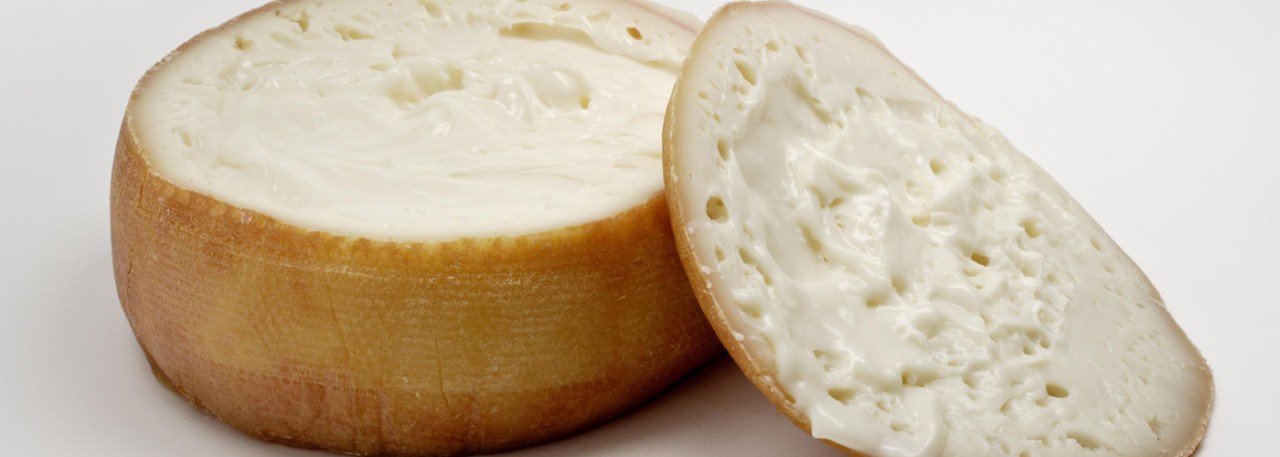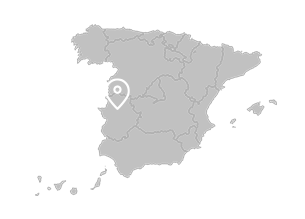.png.transform/rendition-xs/image_image%20(1).png)
Torta del Casar PDO
Cheese made from raw milk from ewes from the Merino and Entrefino types. Natural plant rennet is used for coagulation and ripening takes at least 60 days.
Tasting notes
Intense aroma and well-developed flavor with a touch of bitterness from the plant rennet. Melts in the mouth and has very little saltiness. The texture varies from soft to spreadable.
Other notes
The shape is cylindrical, with flat top and bottom and a flat/convex perimeter. There are three types based on size. All of them have a diameter of at least 7 cm (2½”) and the ratio diameter/height maximum is 50%.Type A weighs 801-1,100 g (1 lb 12 oz - 2 lb 7 oz). Type B weighs 501-800 g (1lb 2 oz - 1 lb 12 oz). Type C weighs 200-500 g (7 oz - 1lb 2 oz). The rind is light, thin, semi-hard and yellow to ochre, sometimes with small cracks on the surface. The paste is white or yellowish and compact, but soft and creamy. There may be some small eyes.
The physical and chemical characteristics are as follows:
- Minimum fat content over dry matter: 50 %
- pH: 5.2 to 5.9
- Minimum dry matter: 50 %
- Maximum sodium chloride: 3 %.
Production / Processing method
The sheep are farmed extensively or semi-extensively, being fed in the traditional way on local pastures. Any food supplements required are regulated and supervised by the Regulatory Council which establishes how the sheep should be handled and fed. These are breeds with a low milk yield, so the milk of almost 20 ewes is needed to produce one kilo of cheese.
The milk must be raw, clean and unadulterated and must come from healthy ewes reared on registered farms. It must be free from colostrum, inhibitors, antibiotics, drugs, preservatives, etc. which might negatively affect the ripening and storage of the cheese as well as its health and hygiene conditions.
The fresh milk is kept for a maximum of 48 hours at a temperature below 4ºC (39.2ºF) to prevent the development of microbes. The cheese-making process begins with coagulation of the milk using natural plant rennet at 26-32ºC (79-90ºF) for 50-90 minutes. The rennet is obtained by soaking filaments of the Cynara Cardunculus thistle flower, known locally as Hierbacuajo, in water.
The curds are then cut using a special implement with thin metal wires until they are the size of rice grains.The resulting paste is then transferred to cylindrical molds and pressed at a pressure of 1-3 kg/cm2(21.3 lbs/sq in) for at least eight hours to drain out all the whey and give the cheese its final shape.
The next stage is salting with sodium chloride. This can be done either by salting the cheese directly or by placing the cheese in brine at a concentration of 16º Baumé for 1-6 hours.
The cheeses are then ripened for a minimum of 60 days at 4-12ºC (39-53ºF) and under relative moisture of 75-95%. They are turned every day to ensure that ripening takes place correctly. During this stage, they obtain their typical dropped shape and some of them have to be wrapped to prevent the paste from leaking out of the soft rind.
The rind may either be left untouched or may be washed and brushed. Cheeses coated with olive oil or other authorized substances are also a traditional product.
Geography / Relief and climate
The production area occupies about 400,000 ha (988,400 acres) in the center-south of the province of Cáceres, stretching northwards to the Sierra de San Pedro which forms the border with the province of Badajoz, to the Almonte river in the east and the Tagus in the north and includes municipalities in the districts of Los Llanos de Cáceres, Sierra de Fuentes and Montánchez, in the province of Cáceres (Extremadura).
The geographical area forms a steppe-like plain crossed from north-west to south-east by the Sierra de Fuentes, with sandy, unfertile, thin soils and many rocky outcrops.
The climate is continental, with long, hot summers, short, mild winters and irregular rainfall between 300 and 500 mm (12 and 20”) per year, mostly in spring and autumn.
Regulatory Council
Avda. de la Constitución, 13
10190 Casar de Cáceres (Cáceres)
Extremadura
Tel: (+34) 927 290 713
info@tortadelcasar.eu
www.tortadelcasar.eu
Sources:
- Spanish Ministry of Agriculture
The rind is light, thin, semi-hard and yellow to ochre, sometimes with small cracks on the surface. The paste is white or yellowish and compact, but soft and creamy.


- Torta del Casar 1
- Torta del Casar 2

Casar de Cáceres (Extremadura)
